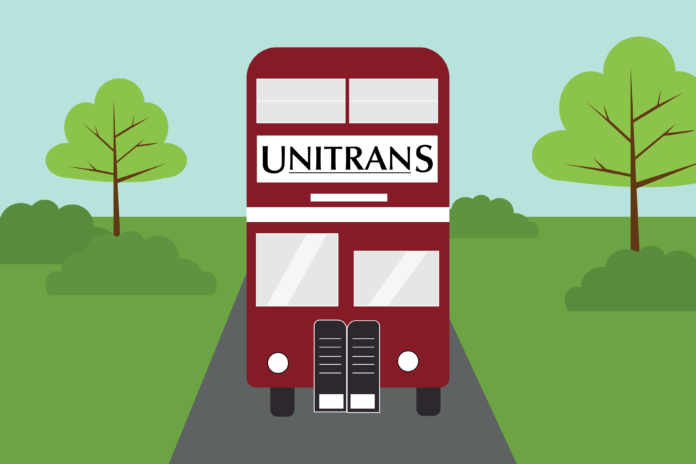With the integration of new environmentally-conscious buses, Unitrans strives to make a sustainable impact on campus
Unitrans buses can be seen all around Davis, transporting students to and from school, marking the town with their red and black colors. While these buses normally run on natural gas, Unitrans recently received a federal grant to introduce new battery-electric buses. For now, this means a slow process of replacing 11 of the older buses.
Given the expenses, the complete switch to electric buses will take time, as acquiring additional funding will be necessary for a complete transition away from fossil fuel use.
“Our goal right now is to never buy a fossil fuel-based bus ever again,” said Jeff Flynn, the general manager of Unitrans. “But we have a fleet of about 50 buses, and to replace all 50 of those is going to take probably about 12 to 15 years, so it’ll be a long transition period. But gradually, every year, we hope to be adding more and more electric buses and retiring more and more fossil fuel buses.”
In order to prepare for the electric buses, the bus parking facility or “The Pad” is currently under construction. Consequently, bus drivers need to park in the Mondavi Center for the time being. Kate Linenbach, a second-year psychology major and Unitrans driver, shared their excitement for this environmentally-conscious change, despite the inconveniences that come with it.
“We’re not super thrilled about The Pad being under construction for so long, but we definitely all recognize the necessity to become more environmentally sustainable, especially with public transportation,” Linenbach said. “The work that we do in terms of preventing climate change is huge. So we all know the importance of what we’re doing, even if things might be a little bit of a mess right now.”
This change not only affects the Unitrans staff but also the greater UC Davis community. Flynn explained that the shift to electric buses aligns with the community goals of Davis.
“Both the City of Davis and UC Davis have really strong progressive carbon neutrality goals,” Flynn said. “So this will help move our city and our campus communities closer to that goal. The buses are quieter, they’re cleaner and they’re a great fit for what our community desires.”
The shift to electric buses provides many benefits, while also moving UC campuses towards the goal of becoming carbon neutral by 2025, as laid out in the Carbon Neutrality Initiative. Camille Kirk, the director of sustainability and the campus sustainability planner at UC Davis, explained the impact this change has, serving as another stride toward greater campus sustainability.
“Every time a unit or department on campus makes a decision to advance campus sustainability, like Unitrans has with electrifying, and invests resources in implementing that decision, we improve our own campus sustainability performance,” Kirk said via email. “And though Unitrans’ greenhouse gas emissions are a small amount of the overall campus emissions, every bit of action helps us meet our carbon neutrality goal by 2025.”
While these buses are creating progress, Kirk shared that they are still not environmentally flawless due to battery usage.
“Electric buses, like electric cars, use batteries that are charged with electricity,” Kirk said via email. “Electric buses are positive steps forward, but they do still need batteries, which have some environmental impacts in their production and disposal. So it is great that we have researchers across the UC system working on figuring out better battery technology.”
According to Flynn, the electric buses should be ready for use sometime in fall 2020. Looking forward, Flynn described his high hopes for Unitrans’ sustainability and growth, working as a resource for students and community members.
“Our hope is that the future [of] Unitrans […] is one that is increasingly cleaner and greener so that we’re always looking for the best and the most reliable, safest clean energy technology to fuel the buses,” Flynn said. “And we hope that over time, the fleet gets cleaner and better for the environment. We also hope that through funding partnerships with the city and the university and others, like the state [and] federal government, we can work towards offering more bus service, having better convenience and less crowding for everybody as well.”
Written by: Nora Farahdel — features@theaggie.org





